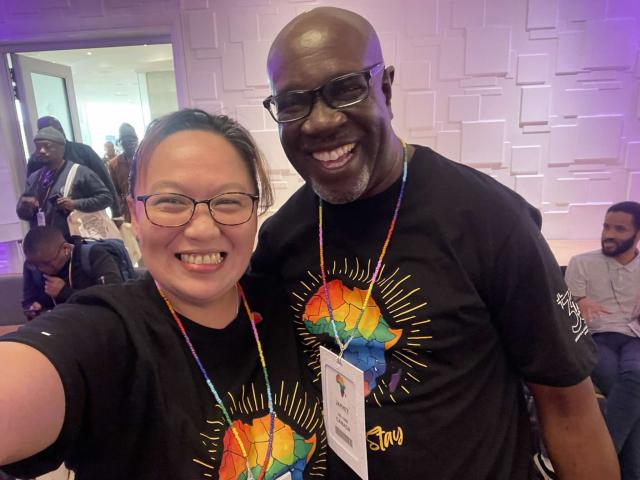At Inclusive and Affirming Ministries’ Cape Town anniversary, Rev. Dr. Japhet Ndhlovu saw a celebration of hopeful progress towards justice.

Arriving at the Inclusive and Affirming Ministries (IAM) 30th anniversary celebration in Cape Town, I was immediately enveloped by an atmosphere of vibrant energy and anticipation. The gathering, set at the beginning of Pride Month, felt like a convergence of journeys—toward visibility, affirmation, and belonging.
The Power of Community
The room was alive with a tapestry of faces: queer individuals from across Africa, allies, church leaders, activists, and NGO representatives. There was a palpable sense of unity, a collective determination to celebrate how far Africa has come and to acknowledge the work still ahead. Africa has long been a landscape where religiously induced queerphobia has taken root and flourished, often shaping both law and social attitudes. Over time, these attitudes became intertwined with political narratives, with leaders and religious figures often framing non-binary gender identity as “un-African” and a threat to traditional values, despite historical evidence of sexual diversity in pre-colonial African cultures. Today, the influence of Christianity and Islam remains a powerful force behind widespread discrimination and violence against queer communities, with religious rhetoric frequently used to justify exclusion, persecution, and the denial of basic rights.
Conversations in Cape Town flowed easily, weaving together stories of faith, identity, and resilience—reminding me that, even in the face of adversity, community is our greatest strength.
Lessons in Focus and Hope
Throughout the event, I was struck by the intentional focus on hope rather than fear. Speakers encouraged us to draw inspiration from successful models of collective action and to make strategic choices that keep us moving forward, rather than getting lost in distractions or division. This message resonated deeply with me, especially during Pride Month—a time when the world’s attention can feel both empowering and overwhelming.
Stories That Transform
One of the most moving moments was hearing Nadine’s speech, which powerfully addressed the pain and marginalization that queer and feminist communities face in religious spaces. Her words challenged us to see tradition not as a static inheritance but as something dynamic, shaped by power and history. She reminded us that interpretation is a matter of survival for many, and that reclaiming our stories and experiences is an act of resistance and hope.
Hansline’s presentation was equally profound, emphasizing theology “from the body”—from lived, messy, beautiful experience. Their story of exclusion and ultimate affirmation through IAM’s work was a testament to the courage it takes to claim one’s place in faith and community. The act of taking communion at home, in secret, became a symbol of sacredness that cannot be denied by any institution.
Personal Reflections
As I listened, I found myself reflecting on my own journey—how often I have felt the need to change my tone or hide parts of myself in religious spaces. The encouragement to organize around hope, to create change through concrete projects, and to challenge the ways power operates in our communities felt both validating and motivating. Teaching, advocacy, and resource-sharing were highlighted as essential tools, even as we recognize that institutional change is slow and often taken up by those already converted to the cause.
Moving Forward
Leaving the celebration, I felt a renewed sense of purpose for the work that we do in the United Church of Canada where there is a place for ALL at the table. The stories, lessons, and collective wisdom shared at IAM’s anniversary reminded me that our lives, loves, and longings are not just valid—they are sacred. Halfway through Pride Month, this gathering was a powerful affirmation that we are not alone, and that together, we are shaping a more inclusive and just future for all.
Rev. Dr. Japhet Ndhlovu is Executive Minister, Church in Mission, with The United Church of Canada.
The views contained within these blogs are personal and do not necessarily reflect those of The United Church of Canada.